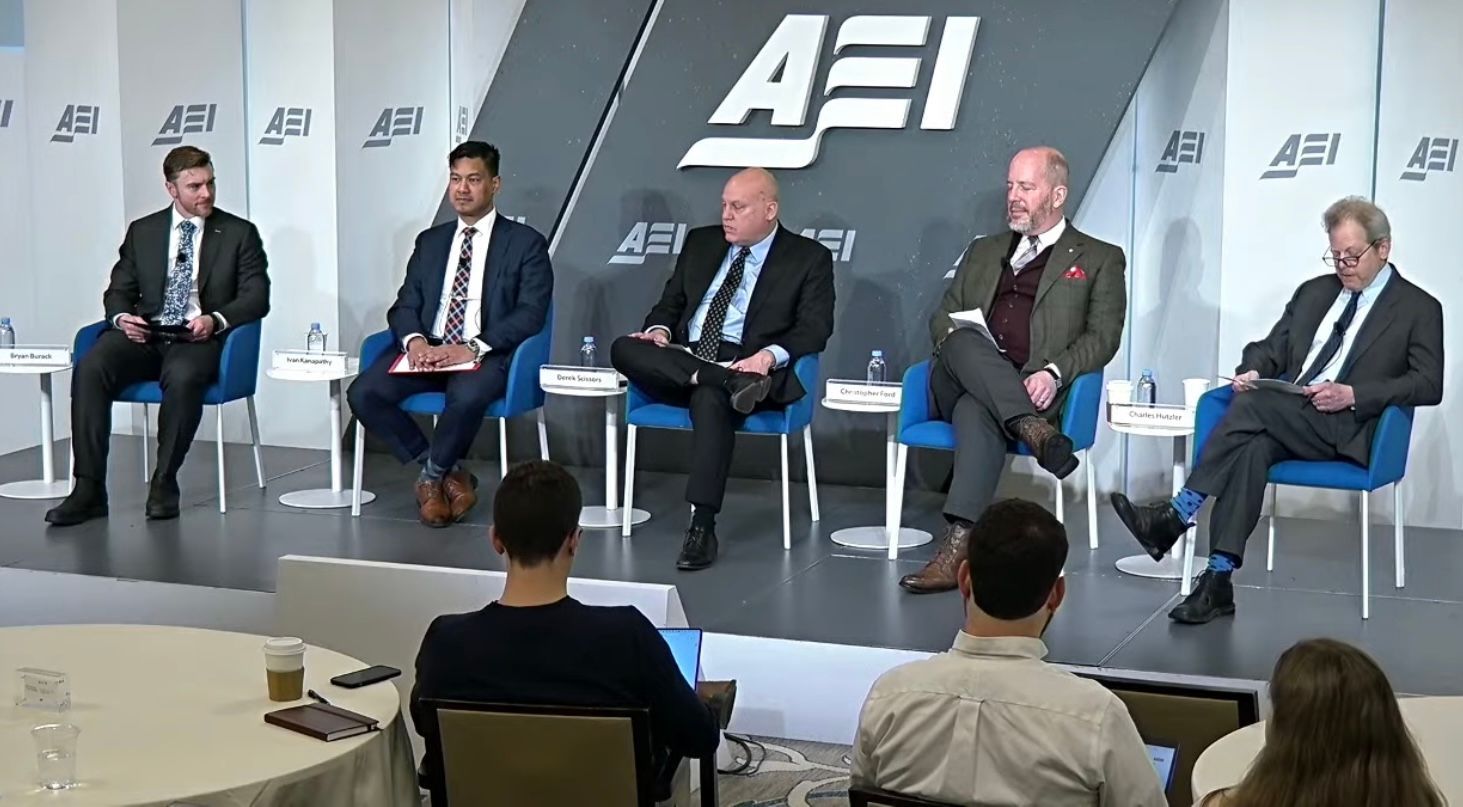The Hon. Christopher A. Ford
New Paradigms Forum -- International Security Policy Since 2009
International Negotiations: A Tool to Serve Our Interests
Note:
This is the text of a Hudson Institute publication by Christopher Ford and Douglas Feith , which is also available through the Hudson website.
“Better to jaw-jaw than to war-war,” Winston Churchill once quipped, showing that not even tough-minded war leaders prefer war to diplomacy in principle. But deciding when to negotiate with foreign adversaries, what to say to them, and when to resort to methods other than talk is not simple. In efforts to resolve international problems, every course of action—including straightforward, non-coercive diplomacy—has its pros and cons.
During the recent U.S. presidential campaign, much-publicized arguments about negotiating with foreign dictatorsrevealed that Barack Obama and his critics (including Hillary Clinton) all were relying on mistaken assumptions. Obama contended, in effect, that the United States should always be willing to negotiate with problem regimes. He implied that it was a matter of principle with him that he would nabout negotiating with foreign dictatorsrevealed that Barack Obama and his critics (including Hillary Clinton) all were relying on mistaken assumptions. Obama contended, in effect, that the United States should always be willing to negotiate with problem regimes. He implied that it was a matter of principle with him that he would negotiate directly and without preconditions with hostile foreign governments. Senator Obama’s political opponents asserted a conflicting principle: that it is wrong for a U.S. president to sit down with leaders of dangerous hostile regimes involved in terrorism.
Properly understood, however, the question of whether to negotiate, even with morally repugnant adversaries, is notone of principle. It is a matter of practical judgment. Even with “axis of evil” regimes, in other words, negotiations are neither good nor bad in themselves. They are tools. If they are a sensible way to achieve our goals, they should be used. If not, not. There is nothing inherently good or bad in negotiating with nasty adversaries. The issue is whether, at the moment, and under the specific circumstances at hand, negotiations are the best way to pursue our strategic goals.
The advantages of formal diplomatic talks are obvious and will be mentioned here only cursorily. But under some circumstances, there are disadvantages too—and they can sometimes outweigh the advantages. Policymakers are responsible for identifying the costs as well as the benefits, and for calculating, in light of all this, whether negotiations are more likely to do good than harm.
I. Communication and Demonstration
Negotiations can serve a straightforward purpose of communication between the parties. Problems that result from misunderstanding may become solvable if the parties come to understand more facts, better grasp each other’s views, and appreciate a fuller range of possible solutions. Negotiations can sometimes produce a “win-win” scenario, but not always. Not allproblems in the world are misunderstandings. Sometimes parties fight precisely because they understand each other’s interests and objectives.
Negotiations can also be useful as a way of making a point to third parties, whether or not agreement is achieved, or even expected. Talks can show the public in your own country or elsewhere, for example, that you are interested in a peaceful solution, even if the other side is not. Negotiations can show that you have “gone the extra mile” before you resort to other action.
II. Manipulation
Throughout history, negotiations have been a vehicle not only for honest communications or demonstrations, but sometimes also for manipulation and deception. Arms control and peace talks have often been used this way.
Consider the example of Chinese and Russian efforts in recent years to promote a treaty preventing an “arms race in outer space.” They aim to preclude any future basing of U.S. weapons in space, while not limiting Chinese and Russian terrestrially-based anti-satellite programs, which aredesigned to put at risk the space assets on which the United States particularly depends. The Soviet Union’s promotion of a “nuclear freeze” in the 1980s was another example of a sweet-sounding but self- serving initiative intended to preserve Soviet military advantages while precluding Western steps to counterbalance.
A. Compliance Asymmetries
There are special problems in negotiations between democracies and non-democracies. Even if they produce an agreement that is reasonable on its face, there will be differences in the way the parties handle compliance. Those differences can work to the disadvantage of the democratic side.
Most democracies, after all, have domestic political and legal mechanisms in place that help ensure their compliance with peace and arms control agreements. The American system of governmental checks and balances helps ensure the U.S. government’s compliance with its international obligations more than any international means of enforcement does. Given the energetic work of the American free press—and the likelihood that any dirty secret will be leaked by a whistle-blower within the government—no U.S. official can reasonably expect that a treaty violation would remain concealed for long. And, a U.S. president would likely have difficulty sustaining a violation of an arms control or other international agreement unless Congress appropriated funds for the prohibited action. No such enforcement mechanisms exist in non-democratic countries, however.
Moreover, there are precious few—and no strong—international mechanisms to compel countries to comply with their international legal obligations. Though it is commonly assumed that countries in general will comply with their international agreements because they fear the price they would have to pay in the world if they were exposed as violators of solemn contracts, there is little basis for such fears—and cynical regimes know it.
It is often difficult for treaty parties to establish that another party has violated its obligations. First, obligations are often written loosely or ambiguously. Second, detecting the activity that constitutes the violation can be a major challenge, especially in countries—such as the Soviet Union, Saddam Hussein’s Iraq, North Korea, and Iran—in which oppressive governments rule over relatively closed societies, permit no free press, maintain no independent judiciary, and frighten their citizens into submissiveness. Third, even if a violation is detected, the aggrieved treaty party might not be able to prove it to the world without exposing sensitive intelligence sources and methods—and might be disbelieved even then. And fourth, even when it is clear to all that a violation has occurred, officials around the world oftenresist taking action to remedy it. Some can be expected to belittle the violation’s significance. Some may say it is not their problem. Others will oppose any response involving significant cost or difficulty. Some will contend that the best time for a firm response is not quite yet. And some will resist every proposed sanction until they can declare that it is too late to do anything about the problem.
The history of the twentieth Century provides many proofs that statesmen show far greater interest in negotiating peace and arms control agreements than in enforcing the agreements already on the books. Examples includeHitler’s violations of the arms control provisions of the Versailles Treaty; Soviet violations of the Anti-Ballistic Missile (ABM) Treaty, the Biological Weapons Convention, and numerous other agreements; and Saddam Hussein’s violations of his obligations under the several U.N. Security Council resolutions put in place in 1991 after the Gulf War.
In a brilliant analysis written in 1961 for Foreign Affairs, [1] Fred C. Iklé warned that Soviet-American arms control could founder on the question of “After Detection—What?”—that is, on the challenge for the United States of taking effective action to counter Soviet cheating after violations are detected. Iklé’s warning was prescient, and for years U.S. officials found that they were more firmly bound by U.S. agreements with the Soviet Union than the Soviets were.
Consider the contrast between U.S. and Soviet approaches to compliance with the ABM Treaty. The Soviets decided to build a substantial defensive system that from the mid-1980s included a large ABM radar at a prohibited location (Krasnoyarsk). By contrast, the United States adhered to the ABM Treaty and did notwithdraw even after U.S. officials discovered (and publicized) the Soviet Union’s material violations of it, and after the Soviets refused to correct those violations.
Despite the Soviet violations, U.S. officials went to enormous trouble—and accepted significant technical constraints—to ensure thatU.S. testing of defensive systems during the 1980s and 1990s complied with the terms of the treaty. In fact, the United States did not withdraw from the Treaty until 2002, more than a decade and a half after detection of the Soviet violations—and not, in fact, in response to these violations, but rather in order to deploy its own post-Cold-War missile defense system. Cheating was never an option for the United States.
One of the clearest multilateral examples of the problem of treaty enforcement was the world’s failure to act in response to Iraq’s use of chemical weapons against Iran in the mid-1980s. Iraq’s actions violated the venerable 1925 Geneva Protocol, and a multinational technical team working for the United Nations confirmed the violations, which were so flagrant and horrible that a special international conference was convened in Paris to address Iraq’s unlawful behavior. Nevertheless, the representatives at that conference proved unable to pass a resolution that even named Iraq—let alone one that actually called for or led to effective action to punish Iraq for the violations. (Little wonder that Iran later gambled that its own pursuit of nuclear weapons, in violation of other international agreements, would trigger no serious international response.)
B. Strategic Stalling
The idea that there is never anything to lose in negotiating with one’s adversaries fails to account for the ways that such talks can be used in bad faith—for example, as a device for strategic stalling.
Thucydides provides an impressive example. Before the outbreak of the Peloponnesian war between Athens and Sparta, the latter sent an embassy to the Athenians proposing that both sides partly disarm by pulling down all fortifications around the peninsula. The Spartans had their own reasons to offer this plan for a mutual ban on strategic defenses. What is notable here, however, is that the Athenian leader told his negotiators to pretend to take the idea seriously, and to negotiate about it with the Spartan envoys long enough for Athens to rebuild its walls higher and stronger than ever.[2]
In our own time, Iran has been playing a similar game. It has been using negotiations to keep the U.N. Security Council off of its back while the Iranian nuclear weapons program progresses. Through a deal negotiated in late 2003 with three European governments, Iranian officials delayed the first imposition of sanctions against their country until 2006, during which time the uranium conversion plant at Esfahan was completed and began operation, and the uranium enrichment facility at Natanz was completed and its first gas centrifuges installed. Tehran, at least, seems to be aware of ways in which the process of negotiating can itself be used to harm the interests of one of the parties. Sometimes, as the humorist Will Rogers put it, “[d]iplomacy is the art of saying ‘nice doggie’ until you can find a rock.” Those who think there is never any harm in negotiating should be on guard lest they find themselves cast as the dog.
C. Talk Itself as a Concession
Dictatorial regimes, like those in Iran or North Korea,can shore up their domestic status and bolster their prestige on the world stage by sitting at a negotiating table across from a major power, especially the United States. U.S. officials should not confer such dignity on a rogue regime for light reasons—or for free. The domestic and international political benefits of negotiations for regimes such as Iran and North Korea can be so substantial that U.S. officials have to weigh this factor as an important cost, or “downside,” of engagement. In other words, whatever the case favoring negotiations with such regimes, it should be balanced against the ability of those regimes to exploit the negotiations to consolidate their anti-democratic hold on their countrymen and to influence other countries.
By participating in the Six-Party Talks with North Korea and supporting the European-led negotiations with Iran, the Bush Administration tried pragmatically to stake out middle ground between refusing to negotiate at all and agreeing to give the regimes in Pyongyang and Tehranthe prestige of formal bilateral dealings with the United States. Many commentators have urged President-elect Barack Obama to negotiate directly with such adversaries, and especially with the Iranian leaders.
The advice is poor when it fails to highlight the political consequences within Iran of any such engagement—and when it fails to credit the U.S. interest in encouraging Iranian workers, students, and women to assert their rights against their country’s unpopular, unsuccessful, and oppressive clerical regime.
D. Messages and Moral Hazard
Negotiations may also do more harm than good if they mislead relevant audiences to think that an insoluble problem is in fact solvable, or that a threat can be forestalled when in fact it cannot. In such circumstances, negotiations can create a false sense of security, and distract participants from taking necessary actions of their own.
III. Conclusion
Officials of the incoming Obama Administration will be reviewing U.S. national security policies across the board. When they ask themselves whether and how they should negotiate with the world’s most troublesome regimes, they will find that simple campaign sound-bites about these questions are of little use.
There is a rich history of how the world’s political leaders have used international negotiations—sometimes for good, and sometimes to facilitate great crimes.
The Obama Administration would do well to approach this subject with due respect for this history. Policymaking in this field requires more than invoking abstract principles or bright-line rules about the inherent virtue or evil of talking to enemies.
President Obama will have the duty to weigh the pros and cons of negotiating with hostile regimes, such as that of the clerics who run Iran. In his campaign he spoke of the advantages of direct talks with the Iranians. As president, he will have to calculate the disadvantages also. Netting out all these considerations is a complex exercise in pragmatic judgment, not a simple moral choice. The new president will bear the responsibility for his analysis and judgment. The wrong answer can produce grim consequences.
-- Christopher Ford & Douglas Feith
ENDNOTES
1. Fred C. Iklé, “After Detection—What?” Foreign Affairs(January 1961), at 208-20.
2. Thucydides, History of the Peloponnesian War (Rex Warner, trans.) (New York: Viking Penguin 1985), bk.I, §§ 90-91, at p.88-90.



Copyright Dr. Christopher Ford All Rights Reserved






